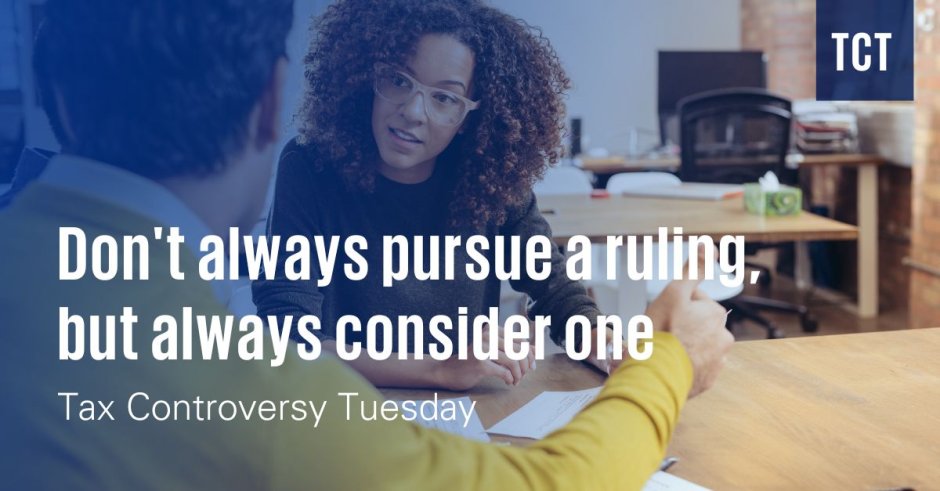Don’t always pursue a ruling, but always consider one

When I recently read the Dutch tax authorities’ 2022 Annual Report on rulings with an international character I was reminded of an anecdote a former colleague had once told me. Together with a young colleague he was meeting with the Dutch tax authorities’ ruling team to discuss the possibility of applying for a ruling. Before the meeting he had told his colleague that what would be awaiting them was “a room where the curtains would be closed and an agreement would be negotiated in an ambiance of cognac and cigars (...)”. Time for a reality check! After 15 minutes they found themselves back outside with empty hands. A big disappointment for the young colleague. The perception of the ruling practice has often turned out to be quite different from reality.
Where the ruling practice used to be seen as a fundamental pillar of the Dutch business climate, the Dutch tax authorities now describe preliminary consultation as ‘an important element of its monitoring policy’.
Reflecting on the added value of a ruling (advance certainty about the correct application of tax legislation and regulations; if a ruling covers transfer prices, then it’s an advance pricing agreement or APA), I recently realized that I could think of just as many reasons why a ruling would not always be such a good idea.
This mainly has to do with the requirements imposed by the Dutch tax authorities since July 1, 2019 for obtaining a ruling. Those requirements are meant to make the process of obtaining rulings clearer, more robust and more transparent. One of the requirements imposed since that date is – understandably – that there is sufficient relevant economic activity in the Netherlands (the nexus requirement). However, this requirement leaves room for subjective interpretation and uncertainty. It involves significantly more presence in the Netherlands than what the list of minimum substance requirements had required since 2001. Additionally, the reason for the application must not be aimed at tax savings, either in the Netherlands or abroad, and the ruling must also not cover transactions with ‘low-taxed’ countries. That seems quite logical, but don’t forget that this may also involve legitimate transactions where the reason for applying for a ruling has absolutely nothing to do with tax savings. Moreover, as part of the desire for more transparency, a summary of the ruling is exchanged with other tax authorities. In practice, the exchange of information on rulings can lead to questions from other countries, and the accompanying administrative burden is something you’d rather avoid.
Since the changes in 2019, a summary of the ruling is published on the website of the Dutch tax authorities within three weeks. In practice, these summaries are properly anonymized so that they cannot be traced back to specific taxpayers. The desire for more transparency about rulings is understandable considering the discussions taking place in the political and public arenas. However, it doesn’t necessarily make the procedure for obtaining rulings from the Dutch tax authorities’ ruling team more taxpayer-friendly. Additional transparency requirements have recently been added, relating to shareholders who hold at least 5% of the shares in a structure.
Nevertheless, I think there are still enough reasons to at least consider pursuing a ruling. And in many cases, the pros will outweigh the cons of a ruling. I think a crucial factor in this is the increasing benefit of certainty in times where international legislation and regulations for international enterprises are constantly subject to change. In practice you see that various stakeholders attach importance to a ‘stamp of approval’ from the Dutch tax authorities. For example, the CEO or CFO, but also the auditor or the Supervisory board. And let’s not forget the fact that certain foreign tax authorities value the opinion of the Dutch tax authorities. A ruling can lessen the risk of double taxation. And if there is double taxation, having a Dutch ruling means you can rely on the Dutch competent authorities to support you in any mutual agreement procedure (MAP).
Finally, I’d like to point out the tendency to conclude bilateral or multilateral rulings. An agreement between the various relevant countries can be of great value. The Dutch tax authorities encourage such bilateral or multilateral rulings. The last few years has seen an increase in such rulings. The number of local, unilateral rulings is decreasing compared to the number of bilateral or multilateral rulings. However, such a process does demand good communication between the various countries. And not all countries are as adept in this respect as the Dutch competent authorities. But a positive outcome can offer an international operating group a lot of certainty.
Therefore: don’t always pursue a ruling, but always consider one.
If you’re interested in hearing more about what Meijburg can do for your organization with regard to tax controversy and tax dispute management, feel free to contact Jens Lamberg - Karreman for an introductory meeting.